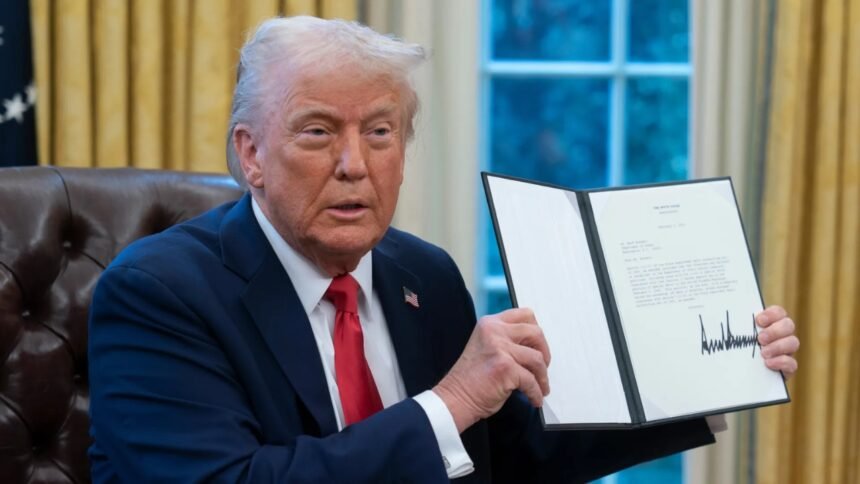In January 2025, President Donald Trump signed a series of Trump gender executive orders that have sparked intense debate across the United States. These directives, aimed at redefining federal policies on sex and gender, assert that only two biological sexes—male and female—will be recognized by the government. For Americans, this shift represents a seismic change in how gender identity, transgender rights, and women’s protections are addressed in public policy. From social media platforms like Reddit to courtrooms, the nation is grappling with the implications of these orders. This blog dives into the specifics of these policies, their societal impact, and the polarized reactions they’ve ignited, offering a comprehensive look at a topic that touches every corner of American life.
Trump Gender Executive Orders: Policy Details
On his first day in office, January 20, 2025, President Trump issued Executive Order 14168, titled “Defending Women from Gender Ideology Extremism and Restoring Biological Truth to the Federal Government.” This order establishes that federal agencies must define “sex” as an immutable biological classification—male or female—determined at conception. It explicitly rejects the concept of gender identity, stating that “sex” and “gender” are not interchangeable. The policy mandates that federal documents, including passports and visas, reflect an individual’s biological sex, effectively erasing recognition of transgender and nonbinary identities in federal contexts. Additionally, it rescinds prior guidance, such as Biden-era policies promoting transgender inclusion, and dissolves the White House Gender Policy Council.
The order’s language is forceful, framing gender ideology as a threat to women’s safety and societal truth. It directs agencies like the Department of Health and Human Services (HHS) and the Department of Justice to align policies with this binary definition. For instance, HHS issued guidance in February 2025 reinforcing that only two sexes exist, impacting healthcare and research frameworks. On Reddit, users in subreddits like r/politics have called this a “rollback of decades of progress,” with some arguing it prioritizes ideology over science.
Additional Orders and Their Scope
Beyond Executive Order 14168, Trump signed related directives targeting specific areas. Executive Order 14187, issued on January 28, 2025, aims to restrict gender-affirming care for minors under 19, prohibiting federal funding for treatments like puberty blockers or hormone therapy. This order has raised alarms among medical professionals, with the American Medical Association emphasizing that such care is evidence-based and supported by major medical bodies. Another order, signed on February 5, 2025, focuses on women’s sports, banning “male competitive participation” to uphold Title IX’s original intent. These policies collectively aim to reshape education, healthcare, sports, and federal employment by prioritizing biological sex over gender identity.
The scope of these orders extends to federal funding, with provisions barring grants from supporting “gender ideology.” This has sparked concerns among nonprofits serving LGBTQ+ communities, as discussed in r/transgender, where users fear reduced access to essential services like domestic violence shelters. The orders also call for revising prison policies to house inmates based on biological sex, prompting lawsuits over transgender inmates’ safety.
Societal and Legal Impacts
The Trump gender executive orders have profound implications for transgender and nonbinary individuals, who make up roughly 1% of the U.S. adult population, according to a 2023 KFF survey. By mandating that federal documents reflect birth sex, the orders create barriers to updating passports or accessing facilities aligned with gender identity. On Reddit’s r/asktransgender, users express fears of being “outed” in everyday situations, like job applications, where mismatched IDs could lead to discrimination. For intersex individuals, whose sex traits don’t fit binary norms, the orders’ rigid definitions ignore medical reality, as noted by experts like Dr. Eve Feinberg, who stated, “Sex is not a singular, binary, immutable trait.”
In healthcare, the ban on federal funding for gender-affirming care for minors has disrupted services. Some hospitals have paused treatments, creating confusion, as reported by NPR. Reddit threads in r/lgbt highlight stories of families struggling to access care, with one user writing, “My kid’s mental health is tanking without their meds.” These policies also affect military families, as TRICARE, the military’s health program, must exclude such care, potentially impacting thousands.
Women’s Rights and Safety Debates
The orders frame their intent as protecting women’s safety and dignity, particularly in single-sex spaces like bathrooms, shelters, and sports. The administration argues that allowing self-identified gender access undermines these protections. Beth Parlato of the Independent Women’s Forum, quoted in NPR, stated, “When you allow men to invade women’s private spaces, it’s dangerous.” This resonates with some Americans, as polls show a majority oppose transgender women competing in women’s sports. On r/conservative, users applaud the orders as “common sense,” arguing they restore fairness.
However, critics argue the orders harm women by reinforcing rigid gender norms and potentially codifying fetal personhood, a concern raised by abortion rights advocates. Dana Sussman of Pregnancy Justice told The Guardian that defining sex at conception could normalize embryos as legal persons, threatening reproductive rights. Feminist organizations like the National Organization for Women have condemned the orders as “extremist,” arguing they endanger both cisgender and transgender women by fostering division.
Legal Challenges and Pushback
The policies face significant legal scrutiny. By April 2025, at least ten lawsuits had been filed, with four securing temporary restraining orders. For example, a Massachusetts federal judge issued an injunction in April 2025, citing “irrational prejudice” against transgender Americans, as reported by Wikipedia. The ACLU, Lambda Legal, and others are challenging policies on passports, prison housing, and healthcare funding, arguing they violate constitutional equal protection rights. On r/law, users debate the orders’ legality, with some predicting courts will strike them down due to conflicts with established precedents like Bostock v. Clayton County, which protects gender identity under federal law.
Seventeen state attorneys general, led by Massachusetts, have opposed the orders, reaffirming commitments to gender-affirming care. States like California, with strong transgender protections, may clash with federal policy, potentially leading to prolonged legal battles. Reddit’s r/news threads highlight public frustration, with one user noting, “This feels like a power grab to control personal identity.”
Broader Societal Reactions
The orders have deepened America’s cultural divide. Supporters, including conservative groups like the Concerned Women for America, view them as fulfilling campaign promises to protect traditional values. Penny Young Nance, CWA’s president, called the orders a “pledge to American women.” Conversely, LGBTQ+ advocates, like the Human Rights Campaign’s Kelley Robinson, argue they “hurt our families” by targeting vulnerable communities. On Reddit’s r/politics, users describe the orders as “cruel,” while r/Conservative users counter that they “protect biological reality.”
Public opinion is mixed. While some Americans support restrictions on transgender sports participation, broader policies like healthcare bans face resistance, especially among younger voters. A 2023 KFF survey found that 60% of Americans believe transgender individuals face significant discrimination, suggesting sympathy for their struggles.
Impacts on Institutions
Schools, workplaces, and federal agencies are navigating the orders’ fallout. The Department of Defense Education Activity faces lawsuits over book bans and curriculum changes tied to “gender ideology,” as reported by the ACLU. In workplaces, federal contractors must align with the orders’ definitions, creating tension with state nondiscrimination laws. On r/askHR, employees discuss fears of losing DEI protections, with one user noting, “My company’s scrambling to comply without violating California law.”
Federal surveys, critical for health and social research, are also affected. The orders ban gender identity questions, alarming researchers like Charles Rothwell, who worry about losing data on transgender health outcomes. This could hinder efforts to address disparities, as discussed in r/science.
Concluding Thoughts
The Trump gender executive orders mark a pivotal moment in America’s ongoing debate over sex, gender, and identity. By prioritizing a binary definition of sex, these policies aim to protect women’s spaces and traditional norms but risk marginalizing transgender, nonbinary, and intersex individuals. The legal, social, and cultural ramifications are vast, touching healthcare, education, sports, and personal freedoms. As lawsuits unfold and public discourse evolves, the nation faces a choice: embrace inclusivity or double down on biological determinism. For Americans, the path forward requires balancing empathy, science, and policy—a challenge that will shape the country’s future. Engaging with these issues, whether through voting, advocacy, or conversation, is crucial to forging a society that respects all its members.






